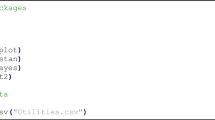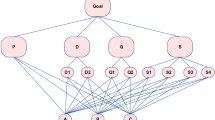Abstract
A substantial body of empirical evidence shows that individuals overweight extreme events and act in conflict with the expected utility theory. These findings were the primary motivation behind the development of a rank-dependent utility theory for choice under uncertainty. The purpose of this paper is to demonstrate that some simple empirical rules of thumb for choice under uncertainty are consistent with the rank-dependent utility theory.
Similar content being viewed by others
References
Allais M. (1953) Le Compartement de l’Homme Rational Devant le Risque, Critique des Postulates et Axiomes de l’Ecole Americaine. Econometrica 21: 503–546
Barrett R. C., Pattanaik P. K. (1994) Decision making under complete uncertainty. In: Dickinson D. G., Driscoll M. J., Sen S. (eds) Risk and uncertainty in economics: Essays in honour of James L. Ford. Elgar, Aldershot
Bernoulli D. (1738) Specimen Theoriae Novae de Mensura Sortis. Econometrica 22(1954): 23–36
Chew S., Karni E., Safra Z. (1987) Risk aversion in the theory of expected utility with rank dependent preferences. Journal of Economic Theory 42: 370–381
Diecidue E., Wakker P. (2001) On the intuition of rank-dependent utility. The Journal of Risk and Uncertainty 23: 281–298
Edwards W. (1955) The prediction of decisions among bets. Journal of Experimental Psychology 50: 201–214
Edwards W. (1962) Subjective probabilities inferred from decisions. Psychological Review 69: 109–135
Friedman M., Savage L. J. (1948) The utility analysis of choices involving risk. Journal of Political Economy 56: 279–304
Kahneman D., Tversky A. (1979) Prospect theory: An analysis of decision under risk. Econometrica 47: 263–293
Karni, E., & Schmeidler, D. (1991). Utility with uncertainty. In W. Hildenbrand & H. F. Sonnenschein (Eds.), Handbook of mathematical economics, Vol. 4, Chapter 33 (pp 1763–1831). North-Holland: Amsterdam.
Kelsey D. (1993) Choice under partial uncertainty. International Economic Review 34: 297–308
MacCrimmon K. (1968) Descriptive and normative implications of the decision theory postulates. In: Borch K., Mossin J. (eds) Risk and uncertainty. MacMillan, London
Quiggin J. (1981) Risk perception and risk aversion among Australian farmers. Australian Journal of Agricultural Economics 25: 160–169
Quiggin J. (1982) A theory of anticipated utility. Journal of Economic Behavior and Organization 3: 323–343
Quiggin J. (1987) Decision weights in anticipated utility theory. Journal of Economic Behavior and Organization 8: 641–645
Quiggin J. (1992) Generalized expected utility theory—The rank-dependent model. Kluwer Academic Press, Dordrecht
Quiggin J., Wakker P. (1994) The axiomatic basis of anticipated utility: A clarification. Journal of Economic Theory 64: 486–499
Ramsey, F. P. (1926). Truth and probability. In R. B. Braithwaite (Ed.), Foundations of mathematics and other logical essays. London: Routledge and Kegan Paul, 1931.
Savage L. J. (1954) The foundations of statistics. Wiley, New York
Segal U. (1987a) Axiomatic representation of expected utility with rank-dependent probabilities. Annals of Operational Research 19: 359–373
Segal U. (1987b) Some remarks on Quiggin’s anticipated utility. Journal of Economic Behavior and Organization 8: 145–154
Von Neumann J., Morgenstern O. (1944) Theory of games and economic behavior. Princeton University Press, Princeton
Yaari M. E. (1987) The dual theory of choice under risk. Econometrica 55: 95–115
Author information
Authors and Affiliations
Corresponding author
Rights and permissions
About this article
Cite this article
Aaberge, R. Empirical rules of thumb for choice under uncertainty. Theory Decis 71, 431–438 (2011). https://doi.org/10.1007/s11238-010-9230-7
Published:
Issue Date:
DOI: https://doi.org/10.1007/s11238-010-9230-7




